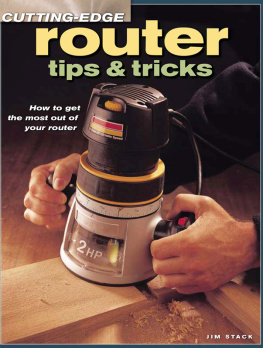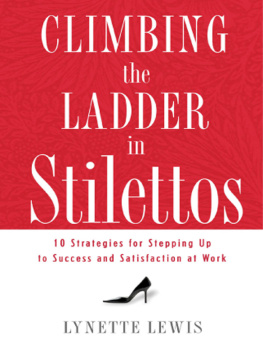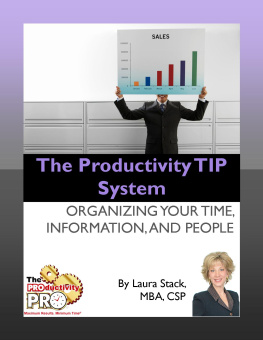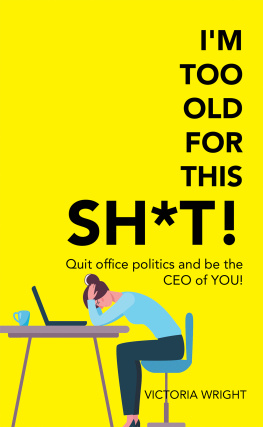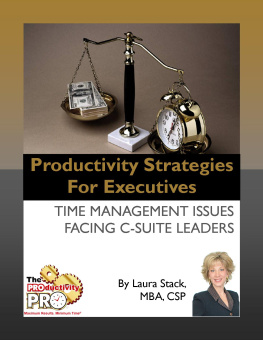Tableof Contents
Express Elevator to Success:
To Heck With That Corporate Ladder!
Hi there! I'm Laura Stack, The Productivity Pro,and I'm here to make a suggestion: if you're tired of climbing the corporateladder, then may I suggest that you take the express elevator instead? Theright productivity habits, vigorously applied, can take you off that oldrung-by-rung advance and supercharge your rise through the corporatestructure. In this presentation, I'll describe the critical habits that canhelp you accomplish this, including how to:
Takefull responsibility for your success.
Focuslaser-sharp on your most important tasks.
Maximizethe use of your time.
Organizeeverything to save time and make life easier.
Tightenup your personal availability.
Takecharge of your technology, rather than letting it take charge of you.
Let's jump right in, and take adetailed look at each of these six habits.
Habit #1: Take Full Responsibility for Your Success
No one's going to justgift-wrap success and hand it to you; and what would it be worth to you if theydid? To be truly successful, you have to take responsibility for getting thereon your own, and frankly, that's a good thing. Personal responsibility providesthe framework for any decent work ethic, especially when it's supported byintegrity and tenacity.
The concept of personal responsibility is founded on asingle, often-painful truth: that where you are today derives almost entirelyfrom your own choices and actions, and the consequences of both. That being thecase, you need to remind yourself at all junctures that you're responsible forwhats happening in your life. Not the economy, not your boss, not thegovernment. You. In the famous words of Harry Truman, "The buck stopshere."
This shouldn't discourage you; because if you truly are incharge of your own life, then you can create your own destiny. As aresponsible, productive adult, you have the freedom to configure life as youwant it to beand Freedom equals Power, always. That said, you also need tounderstand and recognize the give and take between what you want to doand what you need to do in order to succeed and fulfill your obligationsto others. Realizing this, and working within that framework, is where truewisdom lies.
So take a close look at yourlife. If you've been ducking responsibility for something at work, stop now.Step back and consider what you can change for the better. Among other things,this may require that you learn new things, fine-tune your behavior, hone yourwork ethic (and ethics), and seek feedback on your weaknesses and strengths. Ifsome of the things you're doing are keeping you from achieving your goals,eliminate them. If you don't like how things are in your work environment, takeaction to change them.
Accept responsibility foryourself as you are now, and for whatever you need to do to improve yourself.Shifting responsibility to someone or something else is defeatist, dead-endthinkingand you can never be fully productive if you keep thinking that way.You're not a victim. A victim is powerless; you are not.
Habit #2: Maintain Laser-Sharp Focus
To be truly productive, youneed to be able to focus laser-sharp on the tasks that matter to you and yoursuccess. Developing such a tight, unbreakable focus requires stringentself-discipline, but it's worth it because it provides a clear sense ofdirection that will help you get from here to there with a minimum of wastedeffort and time.
It all begins with learning how to give the task at handyour undivided attention which means limiting yourself to one thing at a time.So stop all that multitasking; you can't do everything at once and do anythingright.
Next, stop procrastination deadin its tracks. It's tempting to put a difficult or annoying task off as long aspossible, but all this does is blow the task out of proportion and stress youout. When you find yourself procrastinating, use these methods to snap out ofit so you can get busy:
Visualize.Consider the positive impacts of getting the job doneand the negativeimpacts of not getting it done. Wouldn't it be great to have the taskoff your plate and out the door? On the other hand, do you really want peopleto yell at you for not getting it done?
Strategize.If a task seems overwhelming, think about how you can make it easier. Will an outline help? How about if you break it down intosmaller subtasks?
Eliminatedistractions. If there are things in your environment that usurp yourattention, remove them, at least temporarilyor train yourself to ignore them.
Then there are the "just a little bit more"exercises, as I call them. If you're having trouble focusing, tell yourselfyou'll just do a little bit more of whatever you're working on. "I'll dofive more paragraphs of this report," say, or "I'll work 15 moreminutes on this outline." Then focus in, and when you hit your goal, tryto bribe yourself into focusing just a bit longer. This may be easier than youthink, because by then you'll probably be in the groove, and it'll be easy tokeep going.
It's also important to take careof yourself. You can't be productive if you feel like death warmed over. Youneed to maintain your energy levels to focus properly, and the best way to dothat is to get plenty of sleep, exercise regularly, and eat right. Limit yourcaffeine intake, so you don't get jumpy and dehydrated. Drink plenty ofwaterplain water, nothing fancy. Take breaks when you need them so you canrebuild your energy reserves, and consider taking vitamins for that extra pep.
And finally, if nothing you dohelps you concentrate, check your medications, if any. There are many medicinesthat can impact concentration, so look up the side effects of any you happen totake, and consult your physician as necessary.
Habit #3: Maximize the Use of Your Time
Time may be the great leveler, but you still have to use itas effectively as possible. There are a thousand ways you can do this, large orsmall; but our space here is limited, so let's look at a few of the moreeffective options.
One of the best ways to maximizeyour time use is to maintain to-do lists to help keep yourself on target. Thedaily to-do list is arguably the most important. Be sure to write downeverything you need to accomplish on a particular day, prioritize the tasks,and work your way down the list. According to the infamous 80/20 rule, thehardest and high-value items should come first; and while that's a wonderfulprinciple, I'd like to suggest a slight variation on the theme. If instead youcan defer those high-value tasks until the time of day when you work the mosteffectively, then you can work hardest on those tasks then, and get them doneeven more efficiently.
If you seem to keep runninginto a brick wall because a specific task is too daunting or seems too hard,break the task into manageable chunks with their own internal timescales, andget moving.
What happens if you end up witha to-do list that's got too many things on it? How can you expect to get themall done? You can't, so you have to be realistic. Concentrate on what's mostimportant, which usually means the high-dollar tasks that only you can do. Ifsomething's less important, either delegate it to someone who can do it morecheaply, defer it, or let it go. Unless directed otherwise, never run aroundhandling brushfire issues or doing tasks that are below your pay scale. That'sa waste of time and money.
A worse waste is micromanaging,which is always a concern once you reach the management hierarchy. Not onlydoes it kill employee initiative, which dampens their productivity, if you'restanding over someone's shoulder all day telling them how to do their job, thenwho's doing yours? Why are you wrecking your own productivity when it's easier(and cheaper) to make sure that people get the proper training to do theirjobs, and to replace them when they can't? Contrary to popular opinion, there'sno place for the control freak in management. You may have the power to ensurethat people are productive, but you do have to use it wisely.


